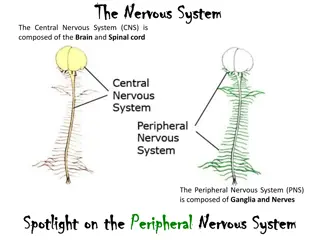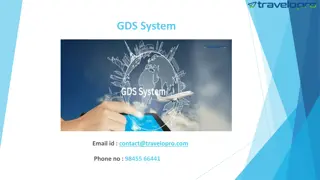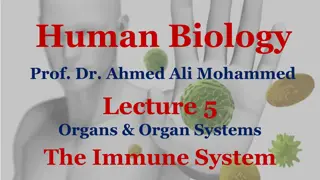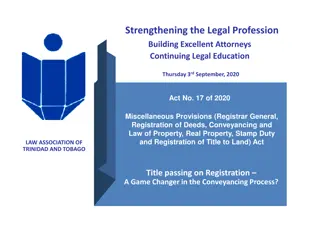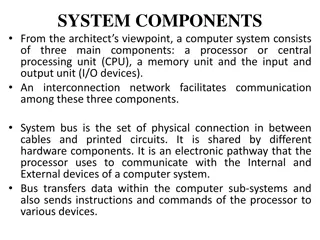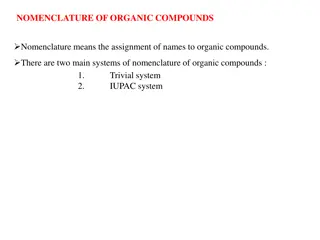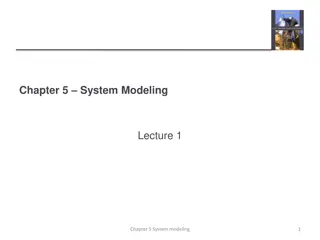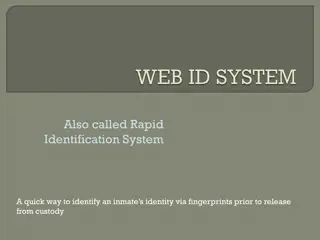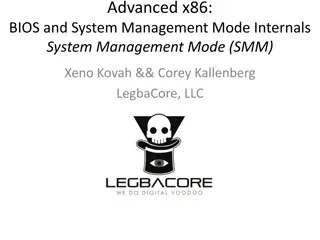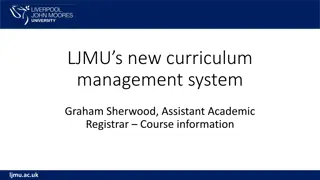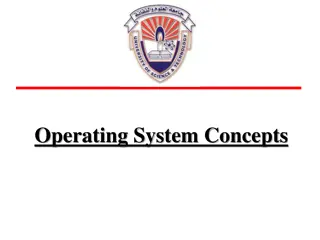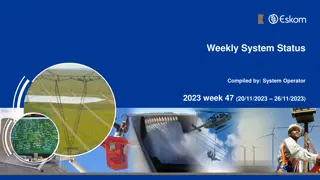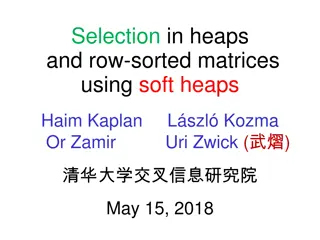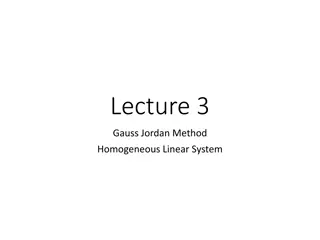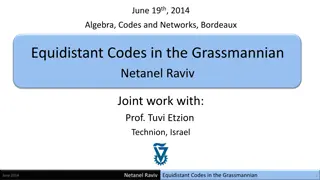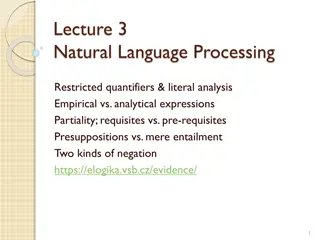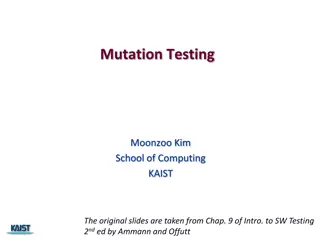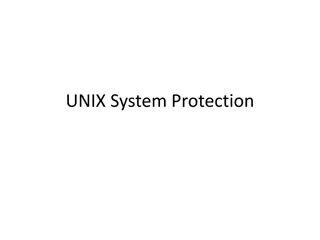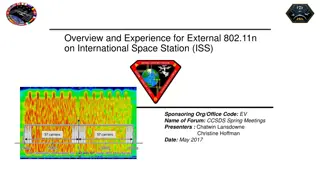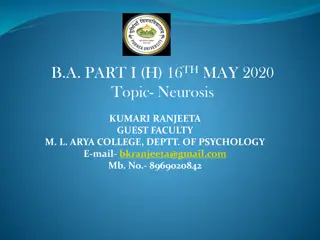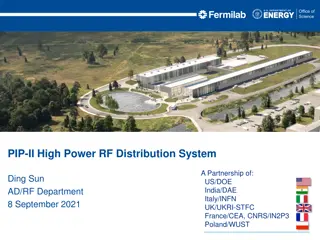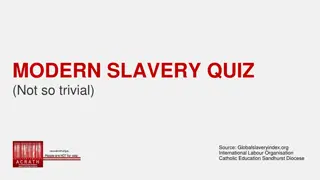adonai software
Adonai college Management System is a cloud-based ERP System that delivers various College and School Management Systems, College and School Management Software, College and School Management System ERP, College and School Management Software System, Online College and School Management Software Sys
3 views • 1 slides
System Models in Software Engineering: A Comprehensive Overview
System models play a crucial role in software engineering, aiding in understanding system functionality and communicating with customers. They include context models, behavioural models, data models, object models, and more, each offering unique perspectives on the system. Different types of system
4 views • 33 slides
Understanding the Nervous System: CNS, PNS, SNS, and ANS
The nervous system comprises the Central Nervous System (CNS) and Peripheral Nervous System (PNS), with the PNS further divided into the Somatic Nervous System (SNS) and Autonomic Nervous System (ANS). The SNS controls voluntary movements of skeletal muscles, while the ANS regulates involuntary proc
2 views • 23 slides
GDS System
Travelopro Global Distribution System (GDS) is a computerized network system. It is a large computer network which is integrated with 100 of worldwide Airlines and consolidators for enabling transactions between travel agents and travel sites and also used by airlines, hotels, car rentals, railways
4 views • 15 slides
Understanding the Immune System: Organs, Functions, and Importance
The immune system acts as a defense mechanism against pathogens and infections, comprising various organs, such as the bone marrow, thymus, spleen, white blood cells, antibodies, complement system, and the lymphatic system. It works to recognize and destroy harmful microbes, maintaining the body's h
1 views • 23 slides
Evolution of Land Law Systems in Trinidad and Tobago
Trinidad and Tobago's land law systems consist of the Common Law System and the Registered Land System. The Common Law system governs unregistered land where title passes upon execution and delivery of the deed. In contrast, the Registered Land System confers ownership upon registration and offers c
0 views • 28 slides
Hamlet's Seventh Soliloquy: Reflections on Revenge and Inaction
Prince Hamlet reflects on the nature of revenge, his own inaction, and the contrast between his hesitation and the willingness of soldiers to die for trivial causes, ultimately resolving to be resolute and decisive in seeking retribution.
1 views • 9 slides
Analysis of Laertes' Attitudes in Shakespeare's Hamlet Extract
In this analysis of an extract from Shakespeare's Hamlet, we explore how Laertes' attitudes towards Ophelia and Prince Hamlet are presented. Laertes is depicted as controlling and disapproving of their relationship, viewing it as trivial and immature. Through close examination of language and imager
1 views • 15 slides
Strong Average-Case Circuit Lower Bounds: A Brief Overview
Exploring the history and motivation behind the Circuit Lower Bounds Program focused on proving complexity class separations through non-trivial derandomization, with a primary emphasis on Strong Average-Case Lower Bounds. Ren and Chen delve into the pursuit to establish ?? ≠ ? since the 1980s.
0 views • 61 slides
Understanding Computer System Buses: Components and Functions
A computer system comprises three main components - the CPU, memory unit, and I/O devices connected via an interconnection network, facilitated by the system bus. System buses reduce communication pathways, enabling high-speed data transfer and synchronization between components. Internal buses conn
3 views • 55 slides
Overview of Organic Compounds Nomenclature
Nomenclature of organic compounds involves assigning names based on two main systems - Trivial system and IUPAC system. Trivial system utilizes names related to discoverers or sources, often with Latin or Greek roots. Saturated hydrocarbons, known as paraffins, contain single bonds and are less reac
0 views • 27 slides
Understanding System Modeling in Engineering
System modeling in engineering involves developing abstract models to represent a system from various perspectives using graphical notations like UML. These models aid in understanding system functionality, communicating with stakeholders, and documenting requirements for new systems. Existing and p
2 views • 53 slides
Rapid Identification System for Inmate Release
The Rapid Identification System, also called Rapid ID System, provides a quick way to verify an inmate's identity using fingerprints before release from custody. It allows law enforcement agencies, including IPD users under SDSheriff, to log in and access the system. By searching the San Diego AFIS
3 views • 8 slides
Understanding System Management Mode (SMM) in x86 Processors
System Management Mode (SMM) is a highly privileged mode in x86 processors that provides an isolated environment for critical system operations like power management and hardware control. When the processor enters SMM, it suspends all other tasks and runs proprietary OEM code. Protecting SMM is cruc
1 views • 26 slides
Understanding Homogeneous Systems of Linear Equations
Homogeneous linear equations are systems in which the constant term in each equation is zero. They can have one or infinitely many solutions but always have at least one solution. Learn how to solve homogeneous systems, distinguish between trivial and nontrivial solutions, and understand null space
1 views • 12 slides
Revolutionizing Paper Mill Operations with AutoRate System by P.L.C
AutoRate system by P.L.C offers a superior alternative to manual feed rate control in paper mills, addressing issues of operator variability and inconsistent system responses. By utilizing a Virtual Controller based on inherent system values, the system enhances overall consistency and efficiency, r
2 views • 12 slides
LJMU's New Curriculum Management System Project Overview
LJMU's new curriculum management system project aims to streamline course information production and storage by implementing the Courseloop system. The project timeline includes releases for data governance, migration, testing, and training leading up to the system's go-live in September 2022. The p
1 views • 8 slides
Understanding Operating System Concepts: Lecture Overview and Services
Exploring the lecture content on operating system concepts, structures, services, system calls, and file manipulation. Delve into the importance of operating system services, error detection, program execution, I/O operations, protection, security, and resource allocation in operating systems. Learn
4 views • 26 slides
Understanding Homogeneous Systems of Linear Equations
Homogeneous linear equations consist of a system where the constant terms in every equation are 0. They can have one or infinitely many solutions, with at least one solution always present. Learn how to solve these systems, distinguish trivial and nontrivial solutions, and explore the concepts of nu
0 views • 12 slides
System Sequence Diagrams: Understanding Artifact for System Behavior
System Sequence Diagrams (SSDs) are vital artifacts that visually illustrate input and output events related to a system. They help define system behavior and interactions, making them essential during the logical design phase of software applications. By depicting events in sequential order, SSDs o
2 views • 24 slides
Weekly System Status Update: Adequacy of National Electricity Supply (Week 47, 2023)
This weekly system status report compiled by the System Operator provides insights into the National Electricity Supply System's adequacy in the medium term. It includes data on historic daily peak system capacity/demand, available dispatchable generation, operating reserve margin, forecast vs. actu
1 views • 14 slides
Selection in Heaps and Row-Sorted Matrices Using Soft Heaps
Generalized selection involves finding the ?-th smallest item from a totally ordered domain with a known partial order. Various interesting selection problems are discussed, including selecting the ?-th smallest item in a heap using both trivial and non-trivial algorithms. The comparison between hea
0 views • 34 slides
Understanding Gaussian Elimination and Homogeneous Linear Systems
Gaussian Elimination is a powerful method used to solve systems of linear equations. It involves transforming augmented matrices through row operations to simplify and find solutions. Homogeneous linear systems have consistent solutions, including the trivial solution. This method is essential in li
0 views • 16 slides
Equidistant Codes in the Grassmannian: Mathematical Structures and Applications
Explore the concept of equidistant codes in the Grassmannian space, discussing their definitions, motivation, and applications in network coding. Learn about the construction of trivial and non-trivial equidistant codes, their properties, and how they play a crucial role in error correction and dist
0 views • 25 slides
Understanding Empirical vs Analytical Expressions in Natural Language Processing
Restricted quantifiers and literal analysis in natural language processing reveal the distinctions between empirical and analytical expressions. While empirical expressions refer to non-trivial intensions that require empirical investigation, analytical expressions denote constant intensions that ca
1 views • 19 slides
Anomalous Heat Transport in Mathematical Physics
Anomalous heat transport deviates from standard Fourier law, exhibiting divergent heat conductance and non-trivial temperature profiles. Observations include long-range time correlations and divergent temperature gradients at boundaries. Models like coupled oscillators and hard disks with alternatin
0 views • 43 slides
Understanding Mutation Testing in Software Testing
Mutation testing involves creating mutant programs by modifying the original program under test to find effective test cases. The process aims to identify weaknesses in test suites by evaluating how well they can detect changes in the program's behavior. Different types of mutants exist, such as dea
0 views • 22 slides
Overview of UNIX System Protection
UNIX System Protection focuses on ensuring security and access control mechanisms within the UNIX operating system. Developed in 1969 by Dennis Ritchie and Ken Thompson at AT&T Bell Labs, UNIX features design elements like a portable API, protection rings, kernel processes, and a trusted computing b
0 views • 12 slides
Understanding Epistaxis: Causes, Sites of Bleeding, and Management
Epistaxis, commonly known as nosebleed, can range from trivial to life-threatening. It can result from various local and general causes, including idiopathic bleeds, trauma, inflammatory conditions, neoplastic growths, and systemic diseases. Understanding the vascular anatomy and sites of bleeding i
0 views • 23 slides
Clear Approach to Cancellation of Asynchronous Operations
This resource discusses the concept of cancellation primitives, providing a clear and consistent approach to cancelling asynchronous operations. It emphasizes separating the source and sink, enabling synchronous and asynchronous observation of cancellation requests. The goal is to facilitate composa
0 views • 17 slides
Understanding the Context of Matthew 23:16-24 and the Strain of Gnat and Swallow of Camel
In Matthew 23:16-24, Jesus rebukes the scribes and Pharisees for prioritizing trivial matters over justice, mercy, and faith. The metaphor of straining a gnat and swallowing a camel illustrates their hypocrisy and neglect of important matters. The passage emphasizes the importance of upholding signi
0 views • 10 slides
Overview of External Wireless Communication System on International Space Station (ISS)
This presentation covers the overview and experience of implementing an external 802.11n wireless communication system on the International Space Station (ISS). It discusses the existing wireless system, committed users, system architecture, and future challenges. The system provides high data rate
0 views • 18 slides
Understanding Neurosis: Symptoms, Behaviors, and Impact
Neuroses are characterized by anxiety, depression, and distress disproportionate to life circumstances. Common traits include complaining, stressing over trivial matters, perfectionism, and dependency. Symptoms of neurotic behavior include irritability, physical complaints with no medical cause, roa
0 views • 10 slides
Marriage Trends in India: A Detailed Overview
India's marriage institution is witnessing shifts with increasing divorce rates. Education, age, and childlessness play roles in divorces, with certain professions showing higher rates. Women are initiating divorces more, and trivial issues are common grounds. Live-in relationships aren't considered
0 views • 57 slides
PIP-II High Power RF Distribution System Overview
The PIP-II High Power RF Distribution System is a collaborative project involving various countries and institutions to develop a sophisticated system capable of efficiently distributing RF power to superconducting cavities. The system consists of multiple distribution lines and components designed
0 views • 28 slides
Evaluating Android Anti-malware Against Transformation Attacks
This study evaluates the effectiveness of Android anti-malware solutions against transformation attacks, focusing on the resistance to various types of malware obfuscations. It explores different transformations such as repacking, trivial changes, and sophisticated obfuscation techniques. Ten popula
0 views • 23 slides
Unveiling Modern Slavery: Take the Not-so-Trivial Quiz
Test your knowledge on modern slavery with this quiz featuring questions about definitions, statistics, and industries involved. Learn more about this critical issue and see how much you know! Images sourced from Globalslaveryindex.org, International Labour Organisation, and Catholic Education Sandh
0 views • 10 slides
Duality in Aesthetic Appreciation of Nature: Triviality and Seriousness
Ronald W. Hepburn delves into the duality present in the aesthetic appreciation of nature, exploring the interplay between the trivial and serious aspects. He discusses the sensuous and thought components, perception versus reflection, superficial versus serious readings, and the importance of consi
0 views • 11 slides
Strategies for Enhancing Extended Producer Responsibility System in Bulgaria
Korea-Bulgaria Knowledge Sharing Program focused on sharing strategies to enhance Bulgaria's Extended Producer Responsibility (EPR) system. The program discusses the current status, performance evaluation, issues, and recommendations related to the EPR system in Korea. It covers topics like beverage
0 views • 38 slides
Understanding Subgroups in Modern Algebra
Subgroups in modern algebra play a crucial role in group theory. A subset H of a group G is considered a subgroup if it forms a group with respect to the operation inherited from G. Trivial subgroups, improper subgroups, examples like (Q, +) being a subgroup of (R, +), and theorems like Theorem 1 an
0 views • 11 slides


